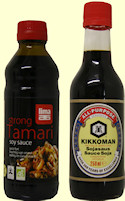Does soy sauce contain gluten? (original) (raw)
 Some of our family members are gluten intolerant, but can still eat soy sauce made with wheat. Although some soy sauces are not wheat-free, the gluten does not appear to be present in the final soy sauce. There are two processes used to make soy sauce: chemical hydrolysis and natural fermentation. Both processes break down complex proteins, including gluten, into smaller components such as amino acids and polypeptides. You should only buy naturally fermented (or brewed) soy sauce for its authenticity and rich flavour. Chemically produced (or artificial) soy sauce is more widely used because it is much cheaper, but can contain toxic and carcinogenic components produced by hydrochloric acid hydrolysis. Therefore, in this article we will only discuss naturally brewed soy sauce.
Some of our family members are gluten intolerant, but can still eat soy sauce made with wheat. Although some soy sauces are not wheat-free, the gluten does not appear to be present in the final soy sauce. There are two processes used to make soy sauce: chemical hydrolysis and natural fermentation. Both processes break down complex proteins, including gluten, into smaller components such as amino acids and polypeptides. You should only buy naturally fermented (or brewed) soy sauce for its authenticity and rich flavour. Chemically produced (or artificial) soy sauce is more widely used because it is much cheaper, but can contain toxic and carcinogenic components produced by hydrochloric acid hydrolysis. Therefore, in this article we will only discuss naturally brewed soy sauce.
What do soy sauce manufacturers say?
Kikkoman's website makes no mention of the presence of gluten in their soy sauce. We found a letter from Kikkoman dated 4 February 2005 which states: "To date, there is no physiological data to show whether soy sauce could cause celiac disease. There is also no officially approved or recommended method of assessment. However, again, it is helpful to compare the level of residual wheat gluten and its fragments with the provisional value of gluten considered by the Codex Alimentarius for gluten-free foods. In view of the above, although soy sauce uses soybeans and wheat as its basic ingredients, any soy protein or wheat gluten found in soy sauce is below the limits of detection at the time of writing".
And what does Lima Foods, a pioneer in the introduction of naturally fermented soy sauce in Europe, say about their soy sauce? They don't say anything about gluten in their shoyu soy sauce, which is made with wheat, but they do mention that their wheat-free soy sauce, tamari, contains no detectable amount of gluten.
Gluten analysis of two popular soy sauces
We sent a sample of Kikkoman and Lima soy sauce to an external laboratory to test for gluten. In both samples, the gluten content was below the detection limit of 5ppm. According to new European legislation, which will not be fully implemented until 2012, gluten-free foods should contain less than 20ppm gluten. The FDA is also proposing a limit of 20ppm. This means that the two products we tested can be considered gluten-free soy sauce.
Conclusion
The naturally fermented soy sauces tested are gluten-free and are unlikely to cause adverse reactions in gluten-sensitive individuals, especially considering the small daily amounts of soy sauce used. Highly sensitive individuals who want to be 100% sure should use soy sauces that are advertised as gluten-free and do not contain grains as an ingredient. Tamari soy sauces are usually made without wheat, but some brands do not follow this tradition and are not wheat-free.